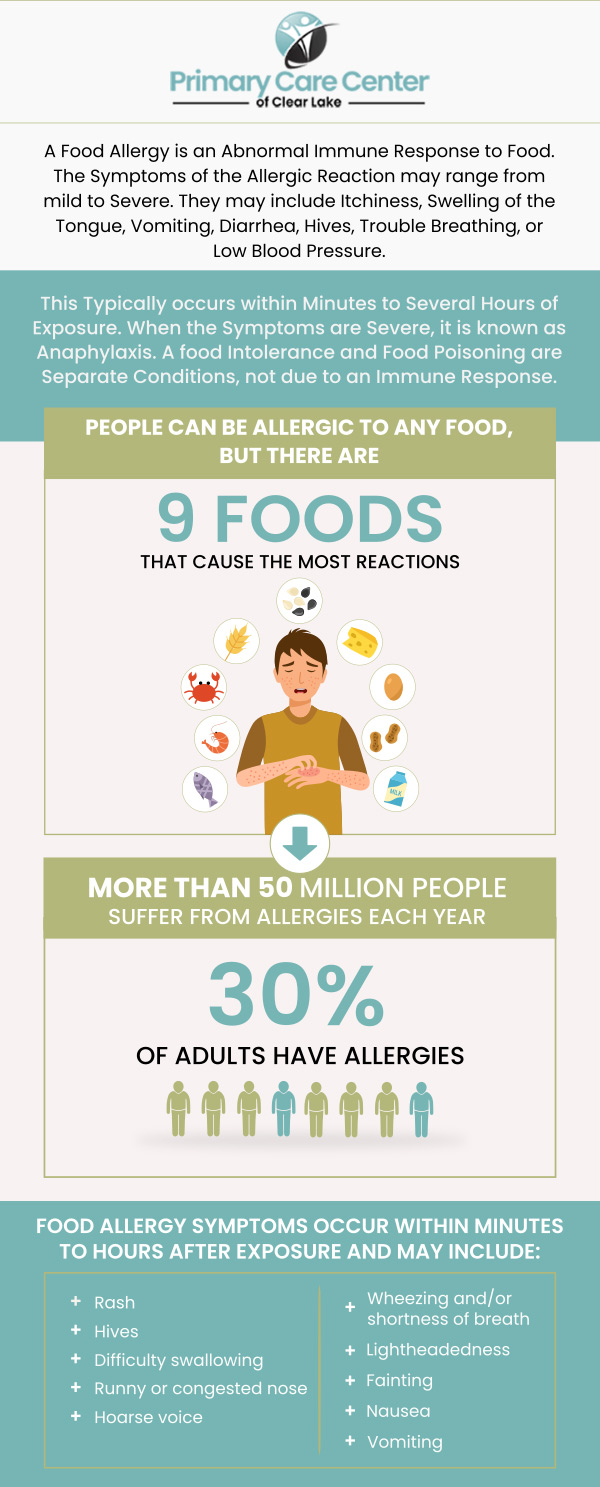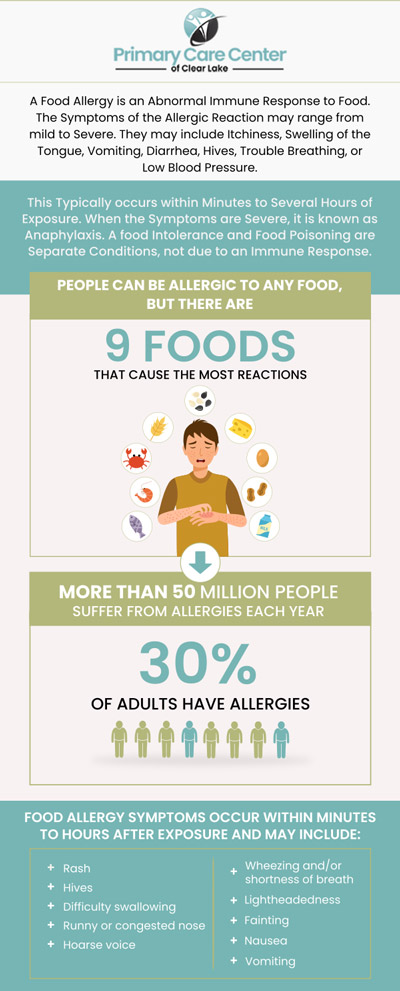Avoiding Food Allergy Reactions in Webster TX: Tips for Safe Eating
Individuals with food allergies should thoroughly examine labels to prevent eating foods to which they are allergic. Even just a small quantity of the allergy-causing food might cause signs and symptoms such as stomach issues, hives, or swollen airways. At Primary Care Center, our board-certified specialists, Dr. Niraj Choudhary, MD, and Dr. Smriti Choudhary, MD, have the extensive knowledge and expertise required to treat and manage any type of allergy you may have to help you reduce the symptoms. For more information, contact us or schedule an appointment online. We have convenient locations to serve you in Webster and Pasadena, TX.




Table of Contents:
How can you prevent food allergy triggers?
How do I stop my body from reacting to allergies?
What autoimmune disease causes food sensitivities?
Can poor gut health cause food sensitivities?
There are dozens—even hundreds—of different types of allergies and a myriad of different symptoms that can manifest as a result of this overreaction of the immune system. People with allergies often experience swelling, redness, itching, or rashes, but may also have trouble breathing or experience anaphylactic shock in severe situations. There are a variety of common allergens, and many people with allergies are allergic to more than one. People who are allergic to peanuts, for example, may also be allergic to tree nuts and shellfish.
Preventing food allergy triggers is a crucial step in minimizing the risk of allergic reactions. While it may not be possible to eliminate the risk, there are several strategies you can adopt to reduce your exposure and stay safe. Some helpful tips to prevent food allergy triggers include:
• Read labels – Always read food labels carefully to identify potential allergens. Manufacturers are required to list common allergens such as peanuts, tree nuts, shellfish, dairy, eggs, wheat, and soy. Avoid products that contain allergens you are sensitive to.
• Avoid cross-contamination – Prevent cross-contamination by keeping utensils, cutting boards, and cooking surfaces clean and separate for allergen-free foods. Be cautious when dining out and inform restaurant staff about your food allergies to avoid cross-contamination.
• Educate others – Inform friends, family, and carers about your food allergies. Teach them how to recognize and respond to an allergic reaction, and emphasize the importance of avoiding allergens.
• Carry medications – Always carry prescribed epinephrine auto-injectors and other medications recommended by your healthcare provider. Be prepared to use them in case of accidental exposure.
Managing and reducing allergic reactions is a key goal for those seeking relief from frustrating symptoms. Although it’s often not possible to completely stop your body from having an allergic reaction, there are certain things to keep in mind:
• Identify and avoid triggers – Work with an allergist to identify the specific things triggering your symptoms. Once identified, take proactive steps to avoid exposure to these allergens in your environment.
• Practice good personal hygiene – It’s advised to wash your hands frequently, especially after being outdoors or coming into contact with potential allergens. Avoid touching your face, particularly your eyes, as this can cause or worsen allergic reactions.
• Use allergy medications – Over-the-counter or prescribed allergy medications, such as antihistamines and nasal sprays, can help you better manage your symptoms and reduce the body’s immune response to allergens.
• Consider immunotherapy – Allergy shots or sublingual immunotherapy can be an effective solution for desensitizing the body to specific allergens over time. If you’re interested in this treatment, consult a knowledgeable allergist to determine if this option is right for you.
Overall, it’s essential to visit an allergy specialist to receive an individualized allergy management plan. By implementing the above strategies and seeking specialized medical guidance, you can take control of your allergies and find relief from your bothersome symptoms.
An autoimmune disorder known as celiac disease causes food sensitivities, particularly to gluten. When individuals with celiac disease consume foods with gluten, it triggers an immune response that damages the lining of the small intestine. This immune reaction leads to a range of uncomfortable symptoms and can result in nutrient malabsorption over time.
People with celiac disease must strictly adhere to a gluten-free diet to manage their condition effectively. Avoiding foods with gluten, such as wheat, barley, and rye, is crucial to preventing adverse reactions. While celiac disease is a well-known autoimmune disease associated with food intolerances, keep in mind that other autoimmune conditions can also result in food sensitivities. Conditions such as autoimmune gastritis, eosinophilic esophagitis, and inflammatory bowel disease (IBD) often trigger adverse reactions to certain foods.
If you suspect you have food sensitivities tied to an autoimmune disease, it’s wise to consult an allergy specialist. Our team can evaluate your concerns, conduct screenings and tests, and provide an accurate diagnosis. With the right management strategies, including dietary modifications and medical interventions, you can navigate your food sensitivities and promote better wellness.
Poor gut health does play a role in the development of food sensitivities. The gut is responsible for the digestion and absorption of nutrients, as well as the regulation of the immune system. When the gut becomes compromised, it can lead to increased permeability of the intestinal lining, also known as leaky gut syndrome. In leaky gut syndrome, undigested food particles and toxins leak into the bloodstream, triggering an immune response. This often results in food sensitivities or intolerances. The immune system recognizes certain food particles as foreign invaders and initiates an inflammatory response.
Maintaining a healthy gut is essential for optimal digestive function and general wellness. Some strategies to support gut health include consuming a balanced diet rich in fiber, probiotics, and prebiotics, managing stress levels, getting regular exercise, and avoiding the excessive use of antibiotics.
Serious food allergies can have an enormous effect on your standard of living. Effective treatments are available at Primary Care Center. For more information, contact us or schedule an appointment online. We are conveniently located at 13920 Osprey Ct, Suite C, Webster, TX 77598. We serve patients from Webster TX, Bacliff TX, Dickinson TX, Seabrook TX, League City TX, Clear Lake City TX, and surrounding areas.
Check Out Our 5 Star Reviews


Additional Services We Offer
• 2D ECHO
• ABI Testing
• Obesity Medicine
• Alzheimer’s Disease
• Anxiety Disorder
• Aortic Aneurysm Screening
• Arthritis
• Asthma
• Body Composition Testing
• Cancer Screening
• Carotid Doppler
• Chronic Condition Management
• Chronic Kidney Disease
• Chronic Obstructive Pulmonary Disease
• Congestive Heart Failure
• COPD & Asthma
• Coronary Heart Disease
• COVID-19 Testing
• Dementia Screening
• Depression
• Diabetes Management
• EKG
• Food Allergies
• Food Sensitivity
• Geriatric Care
• Hypertension
• Outdoor Allergies
• Parkinson’s Disease
• Primary Care
• Resting Metabolic Rate Testing
• Thyroid Scan
• Wellness Exams for Men
• Wellness Exams for Women
• Ozempic
• Integrative Medical Weight Loss
• Men’s Health
• Testosterone Replacement Therapy
• Erectile Dysfunction
• Testosterone Gel and Injections
• Women’s Health
• Menopause
• PCOS
• Hormone Replacement Therapy
• Individual Nutritional and Lifestyle Counselling
• Indoor Allergies
• Internal Medicine
• Lipid Disorders
• Medical Weight-Loss
• Osteoporosis

Additional Services We Offer
• 2D ECHO
• ABI Testing
• Obesity Medicine
• Alzheimer’s Disease
• Anxiety Disorder
• Aortic Aneurysm Screening
• Arthritis
• Asthma
• Body Composition Testing
• Cancer Screening
• Carotid Doppler
• Chronic Condition Management
• Chronic Kidney Disease
• Chronic Obstructive Pulmonary Disease
• Congestive Heart Failure
• COPD & Asthma
• Coronary Heart Disease
• COVID-19 Testing
• Dementia Screening
• Depression
• Diabetes Management
• EKG
• Food Allergies
• Food Sensitivity
• Geriatric Care
• Hypertension
• Outdoor Allergies
• Parkinson’s Disease
• Primary Care
• Resting Metabolic Rate Testing
• Thyroid Scan
• Wellness Exams for Men
• Wellness Exams for Women
• Ozempic
• Integrative Medical Weight Loss
• Men’s Health
• Testosterone Replacement Therapy
• Erectile Dysfunction
• Testosterone Gel and Injections
• Women’s Health
• Menopause
• PCOS
• Hormone Replacement Therapy
• Individual Nutritional and Lifestyle Counselling
• Indoor Allergies
• Internal Medicine
• Lipid Disorders
• Medical Weight-Loss
• Osteoporosis





